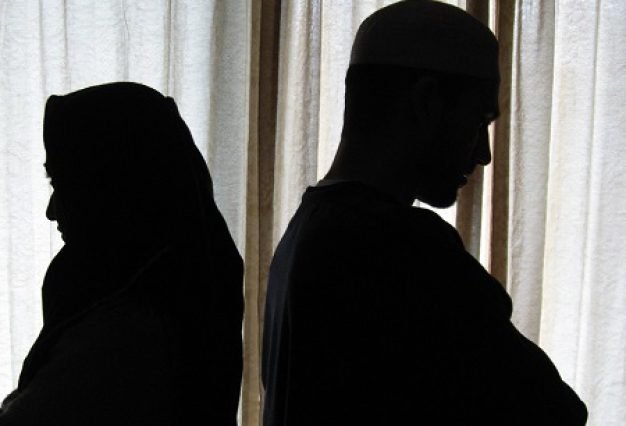Answered by Muftī Yūsuf Badāt
Question:
My wife obtained a khul’ā/ faskh (wife initiated religious divorce). We currently live in the same house. We are unable to come to a mutual settlement regarding our property division, hence our financial matter is with lawyers and Ontario courts. Our interactions in our home are minimal but irritating at times to one another. My question is, is it allowed islamicaly, for me to live in the same house as my ex-wife, who is currently in her ‘iddah (waiting period prior to final completion of religious divorce)?
Answer:
In the Name of Allāh, the Almighty, the Most Merciful, the Most Kind.
Sorry to hear that your marriage has come to an end. May the Almighty grant both of you healing and prosperity, as you move on.
Regarding ‘iddah, the proper etiquette in Islam is that the wife who has been divorced observe her ‘iddah in her husband’s home.
“When you [Muslims] divorce women, divorce them for [the commencement of] their waiting period and keep count of the waiting period, and fear Allāh, your Lord. Do not turn them out of their [husbands’] houses, nor should they [themselves] leave [during that period]” – (Qur’ān 65:1)[1]
“The Prophet of Allāh (peace and blessings be upon him) instructed Furay’ah daughter of Mālik ibn Sinān (may Allāh be pleased with her) as follows, “Stay in your house until the waiting term (‘iddah) lapses. She said, “Thus, I passed my waiting period in the home of my husband.” – (Abū Dāwūd 2300)[2]
In your circumstance, there is no objection in being in the same home while your ex-wife completes her ‘iddah, even though it is a khul’ā divorce, which equals to ṭalāq bāin. You both should respect each other’s space and seek permission from one another before entering each other’s rooms. If things can be easier by having one of you dedicating your separate space in the basement for sleeping, eating and daily activities, that will be better.
As far as your financial matters are concerned, you both should quickly settle the matter whether mutually, through mediation, or with lawyers and the court system, and move on with your individual lives.
Once again, the ‘iddah is observed in the marital home where she lived with her husband when the divorce took place. If her safety and chastity are at stake there, then she may observe it elsewhere, where there is safety. Again, you are OK with being in the same home during the ‘iddah. Just respect each other’s privacy and space. – (Al-Fatāwā Al-Hindīyyah, Vol 1, Page 535, Dār Al-Fikr[3])
And Allāh Knows Best.
[1] إِذَا طَلَّقْتُمُ النِّسَاءَ فَطَلِّقُوهُنَّ لِعِدَّتِهِنَّ وَأَحْصُوا الْعِدَّةَ ۖ وَاتَّقُوا اللَّهَ رَبَّكُمْ ۖ لَا تُخْرِجُوهُنَّ مِن بُيُوتِهِنَّ وَلَا يَخْرُجْنَ – سورة الطلاق ١
[2] فَقَالَ ﷺ امْكُثِي فِي بَيْتِكِ حَتَّى يَبْلُغَ الْكِتَابُ أَجَلَهُ قَالَتْ فَاعْتَدَدْتُ فِيهِ – رواه أبو داؤد ٢٣٠٠
[3] عَلَى الْمُعْتَدَّةِ أَنْ تَعْتَدَّ فِي الْمَنْزِلِ الَّذِي يُضَافُ إلَيْهَا بِالسُّكْنَى حَالَ وُقُوعِ الْفُرْقَةِ وَالْمَوْتِ كَذَا فِي الْكَافِي لَوْ كَانَتْ زَائِرَةً أَهْلَهَا أَوْ كَانَتْ فِي غَيْرِ بَيْتِهَا لِأَمْرٍ حِينَ وُقُوعِ الطَّلَاقِ انْتَقَلَتْ إلَى بَيْتِ سُكْنَاهَا بِلَا تَأْخِيرٍ وَكَذَا فِي عِدَّةِ الْوَفَاةِ كَذَا فِي غَايَةِ الْبَيَانِ إنْ اُضْطُرَّتْ إلَى الْخُرُوجِ مِنْ بَيْتِهَا بِأَنْ خَافَتْ سُقُوطَ مَنْزِلِهَا أَوْ خَافَتْ عَلَى مَالِهَا أَوْ كَانَ الْمَنْزِلُ بِأُجْرَةٍ وَلَا تَجِدُ مَا تُؤَدِّيهِ فِي أُجْرَتِهِ فِي عِدَّةِ الْوَفَاةِ فَلَا بَأْسَ عِنْدَ ذَلِكَ أَنْ تَنْتَقِلَ، وَإِنْ كَانَتْ تَقْدِرُ عَلَى الْأُجْرَةِ لَا تَنْتَقِلُ، وَإِنْ كَانَ الْمَنْزِلُ لِزَوْجِهَا وَقَدْ مَاتَ فَلَهَا أَنْ تَسْكُنَ فِي نَصِيبِهَا إنْ كَانَ مَا يُصِيبُهَا مِنْ ذَلِكَ مَا يُكْتَفَى بِهِ فِي السُّكْنَى وَتَسْتَتِرُ عَنْ سَائِرِ الْوَرَثَةِ مِمَّنْ لَيْسَ بِمَحْرَمٍ لَهَا كَذَا فِي الْبَدَائِعِ، وَإِنْ كَانَ نَصِيبُهَا مِنْ دَارِ الْمَيِّتِ لَا يَكْفِيهَا فَأَخْرَجَهَا الْوَرَثَةُ مِنْ نَصِيبِهِمْ انْتَقَلَتْ كَذَا فِي الْهِدَايَةِ لَوْ أَسْكَنُوهَا فِي نَصِيبِهِمْ بِأُجْرَةٍ وَهِيَ تَقْدِرُ عَلَى أَدَائِهَا لَا تَنْتَقِلُ كَذَا فِي شَرْحِ مَجْمَعِ الْبَحْرَيْنِ لِابْنِ الْمَلَكِ. وَإِذَا انْتَقَلَتْ لِعُذْرٍ يَكُونُ سُكْنَاهَا فِي الْبَيْتِ الَّذِي انْتَقَلَتْ إلَيْهِ بِمَنْزِلَةِ كَوْنِهَا فِي الْمَنْزِلِ الَّذِي انْتَقَلَتْ مِنْهُ فِي حُرْمَةِ الْخُرُوجِ عَنْهُ كَذَا فِي الْبَدَائِعِ لَوْ كَانَتْ بِالسَّوَادِ قَدْ دَخَلَ عَلَيْهَا الْخَوْفُ مِنْ سُلْطَانٍ أَوْ غَيْرِهِ كَانَتْ فِي سَعَةٍ مِنْ التَّحَوُّلِ إلَى الْمِصْرِ كَذَا فِي الْمَبْسُوطِ الْمُعْتَدَّةُ إذَا كَانَتْ فِي مَنْزِلٍ لَيْسَ مَعَهَا أَحَدٌ وَهِيَ لَا تَخَافُ مِنْ اللُّصُوصِ وَلَا مِنْ الْجِيرَانِ وَلَكِنَّهَا تَفْزَعُ مِنْ أَمْرِ الْمَبِيتِ إنْ لَمْ يَكُنْ الْخَوْفُ شَدِيدًا لَيْسَ لَهَا أَنْ تَنْتَقِلَ مِنْ ذَلِكَ الْمَوْضِعِ، وَإِنْ كَانَ الْخَوْفُ شَدِيدًا كَانَ لَهَا أَنْ تَنْتَقِلَ كَذَا فِي فَتَاوَى قَاضِي خَانْ – كتاب الفتاوى العالمكيرية الفتاوى الهندية مجلد ١ صفحة ٥٣٥ دار الفكر




